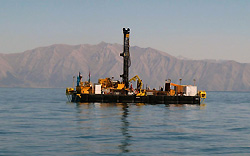The spatial distribution of vegetation and vegetation fires in Lake Van (Eastern Anatolia, Turkey) during the last 600,000 years may provide insights into climate change. Organic matter in varved lake sediments, including residues of burned organic matter (black carbon, BC), provides a high resolution record of vegetation and vegetation fires. We analysed sediment samples of a 219 metre long and 600,000 year old sediment core from Lake Van in Eastern Anatolia for black carbon (supported by the International Continental Scientific Drilling Program and provided by Prof. Dr. Thomas Litt, University of Bonn). We aimed at identifying the relationship between fire intensity and burning temperature to (i) vegetation composition and (ii) climate change.
|
|











